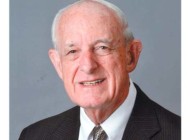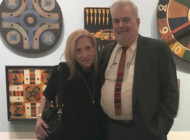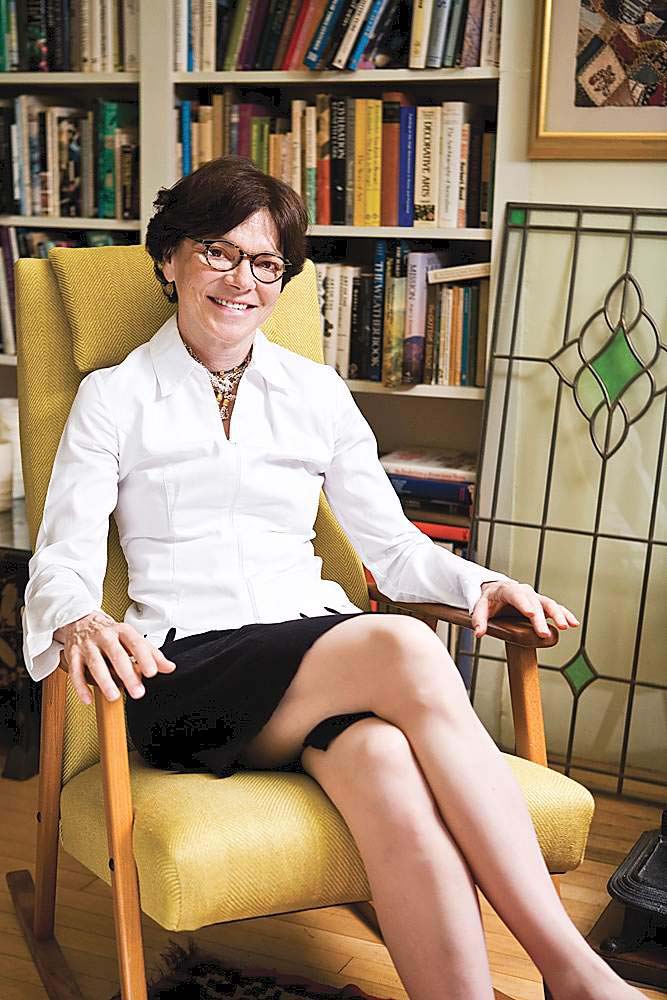
Photo courtesy The Magazine ANTIQUES.
By Madelia Hickman Ring
BROOKLYN, N.Y. — Elizabeth Jane “Betsy” Turner Pochoda passed away from complications due to ALS on May 8, at her home in Brooklyn; she was 83.
She was born in Chicago on December 13, 1941, the youngest of three children of Frederick W. Turner, Jr, and Frances Franklin. Her father was a lawyer, her mother ran the family’s household.
Betsy graduated from Connecticut College with a BA in English literature in 1963; she followed that in 1968 with a PhD in medieval literature, from the University of Pennsylvania. It was at Penn that she met Philip Pochoda, an assistant professor of sociology; they married in 1968. In 1977, the couple had a daughter, Ivy Claire Pochoda but would separate around 1990; their divorce would not become official until around 2002.
Initially an academic — Betsy was a professor of English literature at Temple University — she switched paths and became the literary editor of The Nation in 1976, where she worked until 1982, then again from 1986 to 1989 following a stint as editor at Vanity Fair (1982-84). After a year at The New York Post (1989-90), she was one of the founding editors of Entertainment Weekly (1990-93) before working for The Daily News (1993-94). A brief tenure at Vogue led to work at Mirabella (1994-95) and House & Garden (2001-09) before she joined The Magazine ANTIQUES in 2009 as its fifth editor in chief. She held that position until 2016 when she became its advisory editor, the title she had at the time of her death.
Other than her 1971 doctoral thesis, which was titled Arthurian Propaganda: Le Morte Darthur as an Historical Ideal of Life, she penned an introduction to Milan Kundera’s The Farewell Party (1977).
Betsy’s daughter shared that she was an avid cyclist and a passionate college basketball and New York Yankees fan. She kept up with modern music, was in tune with new releases and her interests in music ran the gamut of music genres from Bob Dylan to hip-hop. She enjoyed traveling to visit places she wrote about in ANTIQUES and to museums outside mainstream art circles, particularly those that represented Black artists. She loved to go to book events in the US and in Europe with Ivy, as well as Corsica and Leon. Summers were spent in Maine with her best friend, Judyth Van Amringe.
“She liked to stay out of the spotlight and relished the lowbrow as much as the highbrow,” Ivy Pochoda said.
Betsy was predeceased by her parents and brother, Charles H. Turner. She is survived by her daughter, author Ivy Claire Pochoda, granddaughter Loretta, both of Los Angeles, and brother, Frederick W. Turner, of Santa Fe, N.M.
In lieu of flowers, donations in Betsy’s memory may be made to ALS United Greater New York (www.als-ny.org) or the canine rescue organization, Bullies and Buddies (www.bulliesandbuddies.com).
Ivy Pochoda is planning a celebration of life in the Spring of 2026, the weekend before Easter, in Red Hook, Brooklyn. Details to be announced.
Elizabeth Pochoda (1941-2025) In Memoriam
Compiled By Madelia Hickman Ring
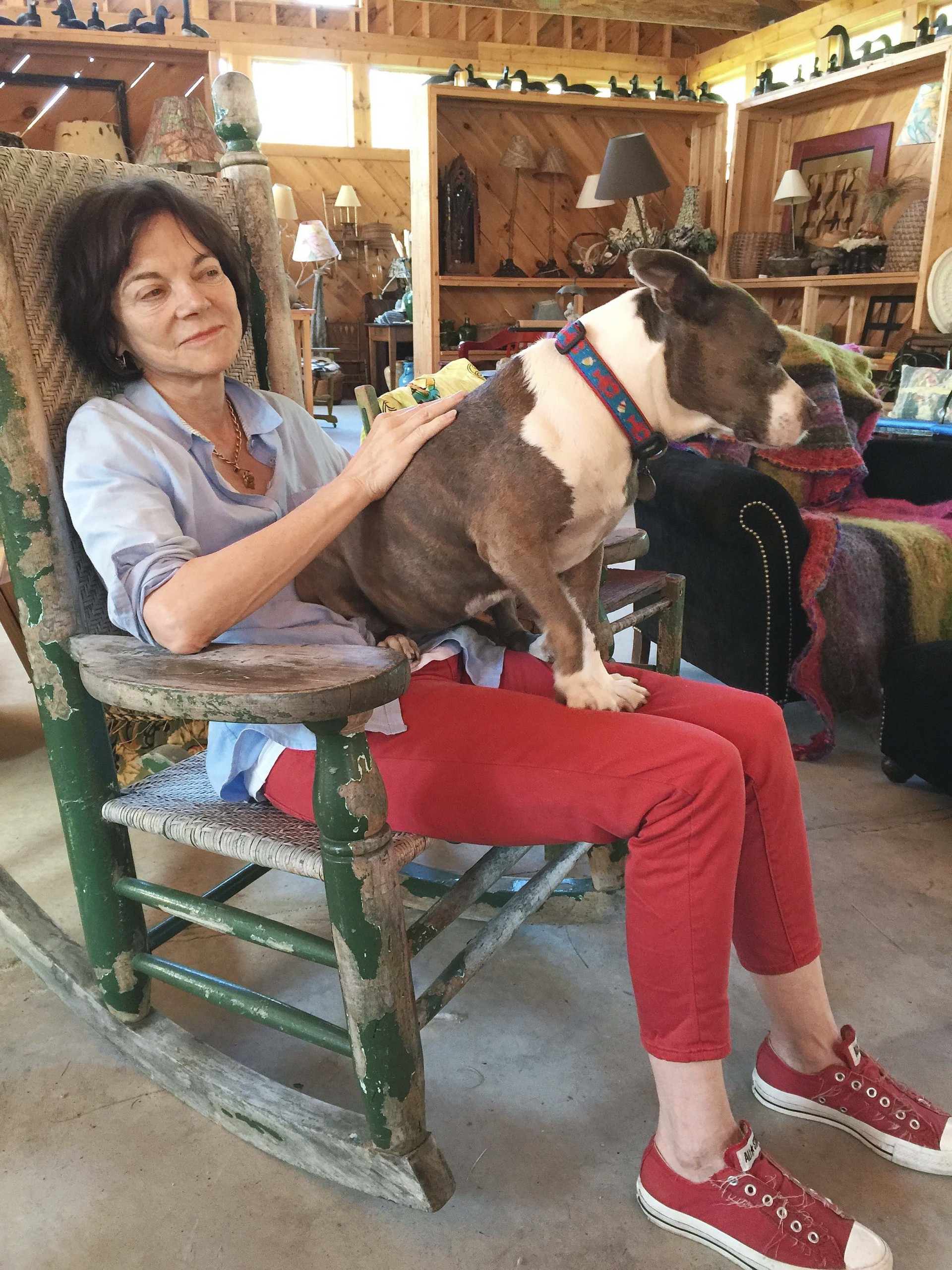
Betsy with Violet, circa 2009. Photo courtesy Ivy Pochoda.
Betsy sparkled. She exuded energy and had an irrepressible appetite for life. She was fiercely bright, with no intellectual arrogance, and the times we spent with her were always precious and peppered with fun and laughter.
We first met her at the San Francisco Fall Antiques Show in 2008, shortly after she became editor at The Magazine ANTIQUES. She was full of questions, which she posed with interest, a steady gaze and warmth, so a conversation began, which really only ended when we last saw her at the beginning of February this year, some 17 years later!
A genuine friendship grew between us, with shared interests in art/antiques/design, travel, politics, theater, the outdoors, history, music, literature (which she and Josyane were always discussing, sharing views and recommendations), wine/food/restaurants/cooking…and people. Betsy was the skinniest proper foodie I’ve ever known.
She left our first meeting to join up with her daughter, the author Ivy Pochoda, who had traveled to the West coast to catch-up with her mum. When we met the two of them the following morning, they said they had started off their day with oysters and Anchor Steam beer at the wonderful, long-established Swan Oyster Bar at 7 am! I remember thinking how special it was that a mother and daughter should start a day together like that and we grew to learn that such events were typical of their warm relationship and gloriously irreverent and independent natures.
Betsy wrote with discipline and rigor. She cared about grammar and was a compulsive researcher. She cherished facts and accuracy but was also happy to allow some personal responses and insights wander into her writing when she felt it was applicable. With her powerful intellect, investigative and explorative spirit and human touch, she had a magical way of writing that never patronized or bored her readers. She wrote in a manner that felt like she was chatting to you. Simply brilliant.
As editor, she commissioned me to write for the magazine a couple of times (which felt intimidatingly like being asked to sing by Pavarotti!). I sent her the first draft with trepidation. She replied very quickly and said it was fine, just needed “a little tidying up, and why have you used all those commas?” Within half an hour, she had completed her “tidying up” and returned an article to me that I would have been most proud of writing. She had cleverly distilled the essence of the piece, somehow retaining my voice in it and certainly safeguarding all the facts and information, but she had conjured with the words in such a way that it became eminently more readable. I always told her that hers was the best piece of writing that ever went out under my name.
Betsy had a natural appreciation for design and was enthused by the art, antiques and decorative arts that were the lifeblood of her publication. She was also enthralled by the people (scholars, collectors and dealers alike) who handled and worked with them, making many friends and winning admiration for her writing and her “mission” to inspire others. Betsy grew to become a valued and respected figurehead in the industry. She loved the narratives and history that surrounded the pieces and was excited by their aesthetic qualities. She met and interviewed many collectors, academics, dealers, curators and active art market participants and shared their homes, collections, thoughts and insights in her publication, which lent a genuine human side to a previously somewhat dry exclusive domain. I believe that she not only “modernized” The Magazine ANTIQUES and made it more relevant to Twenty-First Century readers, but also helped to recontextualize antiques, shake off some of the cobwebs and introduce them to a new public in a fresh, innovative and engaging human voice.
Effortlessly stylish, Betsy lit up a room with her wit and elegance. She had a youthful demeanor and was easy to spot in a crowded room with her gamine hairstyle and colorful personality. She had a disarming charm and a mischievous manner, an unmistakable gait, boundless energy, exciting curiosity and a feisty spirit. Betsy was simply and naturally cool.
We giggled together…a lot.
We ate, drank and enjoyed music together, we listened and talked together, we agreed and disagreed, we enjoyed lively discussions and silences together. We even enjoyed crazy snowballing on the streets of the Upper West Side after a “wine tasting” dinner with an old friend. She was playful, wonderful company and a generous, seemingly effortless hostess.
Over the years, we developed a tradition of going to her Brooklyn home late on the Sunday evening, after The Winter Show closed. We invariably arrived exhausted, dusty and bedraggled after the breakdown, and she received us with a large vodka for Josyane and a malt whisky at the ready for me, frequently offered alongside her scrummy homemade salt cod brandade, the best I’ve ever tasted. She would then cook steak for us, on her knees, over the log fire in her sitting room and ritually open a bottle or two of Vieux Telegraphe wine. Conversation and wine always flowed well into the small hours. It was special for us that we were able to observe the same tradition with her and Ivy again this year. She was one brave cookie.
Spending time with Betsy was enlightening and invigorating. She was energetic and active, sometimes challenging, fiercely loyal, consistently inquisitive, warm, respectful, witty, sensitive and always fun. A wonderful and cherished friend.
She leaves us with wonderful memories, but New York will not feel the same without her.
—Robert Young, Robert Young Antiques, London
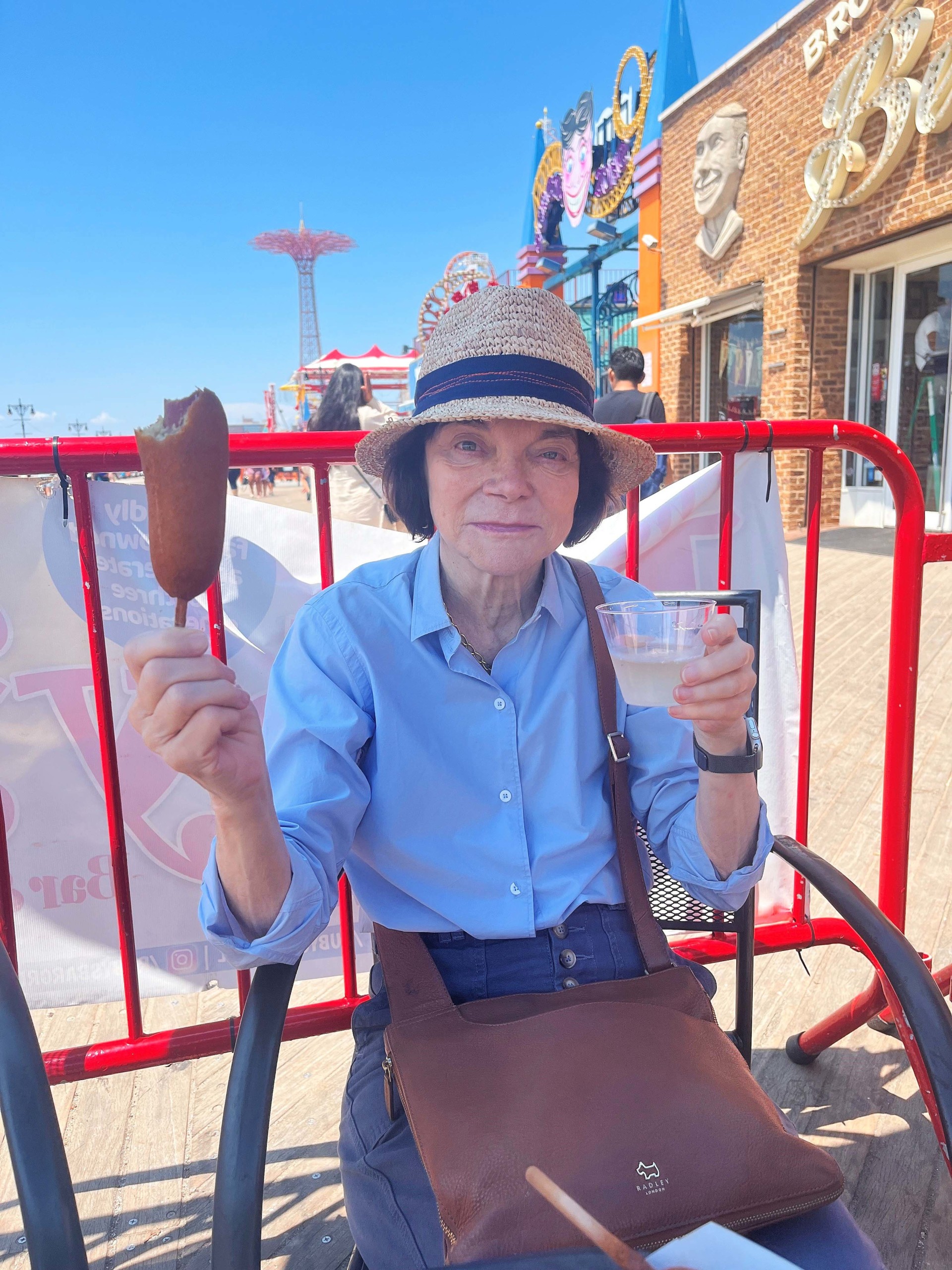
2024 photo, courtesy Ivy Pochoda.
I liked Betsy from the moment I met her. She would give you that wry smile. She was fiercely intelligent and inquisitive. In conversation, I always felt like I was being interviewed. Betsy was a fellow Brooklynite and cyclist. She lived in my neighborhood, and I rode by her townhouse at the start of each ride — when I saw her on her stoop, I’d wave and yell, “Betsy” and I’d see that smile. I’ll miss anticipating seeing her.
—Steve Powers, Steven S. Powers Works of Art, New York City
Those of us who were fortunate to know Betsy and her skills in journalism and editing may not have been aware of a hidden side: that of her sports acumen. Betsy was born in the Chicago area. She was raised as a lifelong fan of the Chicago Cubs and her hero, Ernie Banks. He was a quiet star for a team that never received the accolades they deserved, much like Betsy with her quiet nature.
Moving to New York City, the Yankees became her team of interest. Of late, Aaron Judge stole her heart, not only for his great skills, but for his quiet leadership and team effort. He is now the team captain, as she was the quiet captain in her field.
But it was the University of Connecticut women’s basketball, led by Geno Auriemma and Chris Dailey, that captured her heart. Twelve months of the year, Betsy would scour the sports pages looking for tidbits of news on the greatest women’s college basketball team and the coaches who accomplished the “impossible.” Before the team was a household name, Betsy wrote of the remarkable coach and his cadre of players willing to give it their all to create the team it is today. Betsy did the same in journalism: she sought out character, skills and those who would sacrifice for the team. UConn has won many National Championships with pennants raised in their honor. The same would be true of Betsy if the honor was available to be bestowed.
—Arthur S. Liverant, Nathan Liverant and Son Antiques, Colchester, Conn.
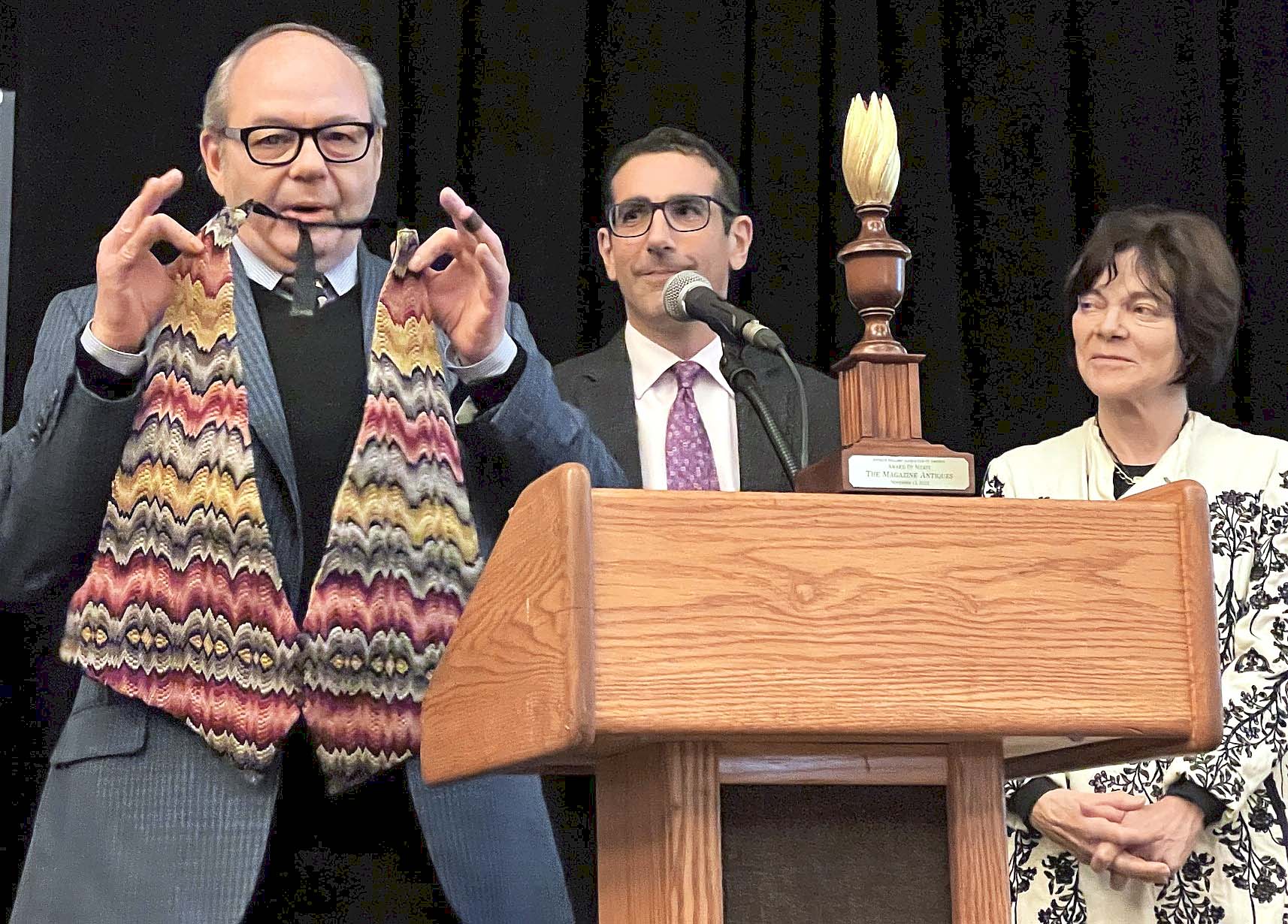
Betsy Pochoda, right, at the ADA Award Dinner honoring The Magazine ANTIQUES, with then-editor and co-owner Gregory Cerio (1960-2024), left, and Don Sparacin, publisher and co-owner, center. Laura Beach photo for Antiques and The Arts Weekly.
Betsy was an extraordinary colleague and friend, who I first met in my days as chief curator at the Virginia Museum of Fine Arts. We became closer after I moved to The Met, where we bonded over our UPenn graduate studies, eclectic cultural interests and shared belief in the importance of exploring inclusive, truthful histories through a variety of interpretive lenses. Betsy was an impressively expansive thinker, reader, writer and editor, and one of the most astute cultural commentators on a range of topics that excited her deep curiosity. I will miss her fierce brilliance as well as her sharp eye and wit but, most of all, the deep empathy and generosity that shaped her life and labors.
—Sylvia Yount, the Lawrence A. Fleischman Curator in Charge of the American Wing, The Metropolitan Museum of Art, New York City
A cherished friend and colleague, Betsy Pochoda was a brilliant light in life and guiding star in the antiques industry. I am so grateful for the opportunity to have worked closely with Betsy during the writing of two articles in published in The Magazine ANTIQUES. It was her unique combination of intensity and humor that stands alone. She had the amazing ability to make me feel both personally challenged and at ease at the same time.
Betsy came into the antiques world to fill the immensely large shoes of Wendell Garrett, the legendary editor of The Magazine ANTIQUES. Not only did Betsy fill those shoes, she soon fashioned her own unique shoes that left an indelible mark. In January 2009, shortly after taking the editorship, Betsy wrote, “Faithful readers will be aware that ANTIQUES now writes about people, and shows them too, far more than it did in the past. Forging the connection between people and objects is something we will continue to do with regular profiles of curators, collectors and dealers…” It was this personal touch and genuine interest in people that Betsy combined with an unquenchable curiosity. This distinctive combination served as the bedrock of her success.
As much a wordsmith as a people person, Betsy opened many doors, as well as minds and hearts. Even during a brief conversation, Betsy could quickly earn the respect of others by sharing her incredible depth of knowledge and piercing perspective. She would always ask the most probing questions and challenge the traditional way of viewing the world. Then, Betsy would follow up with a laser-focused comment and a twinkle in her eye. This is the Betsy Pochoda that I am honored to have known and grateful to carry in my heart every day.
—Kevin J. Tulimieri, Nathan Liverant and Son Antiques, Colchester, Conn.
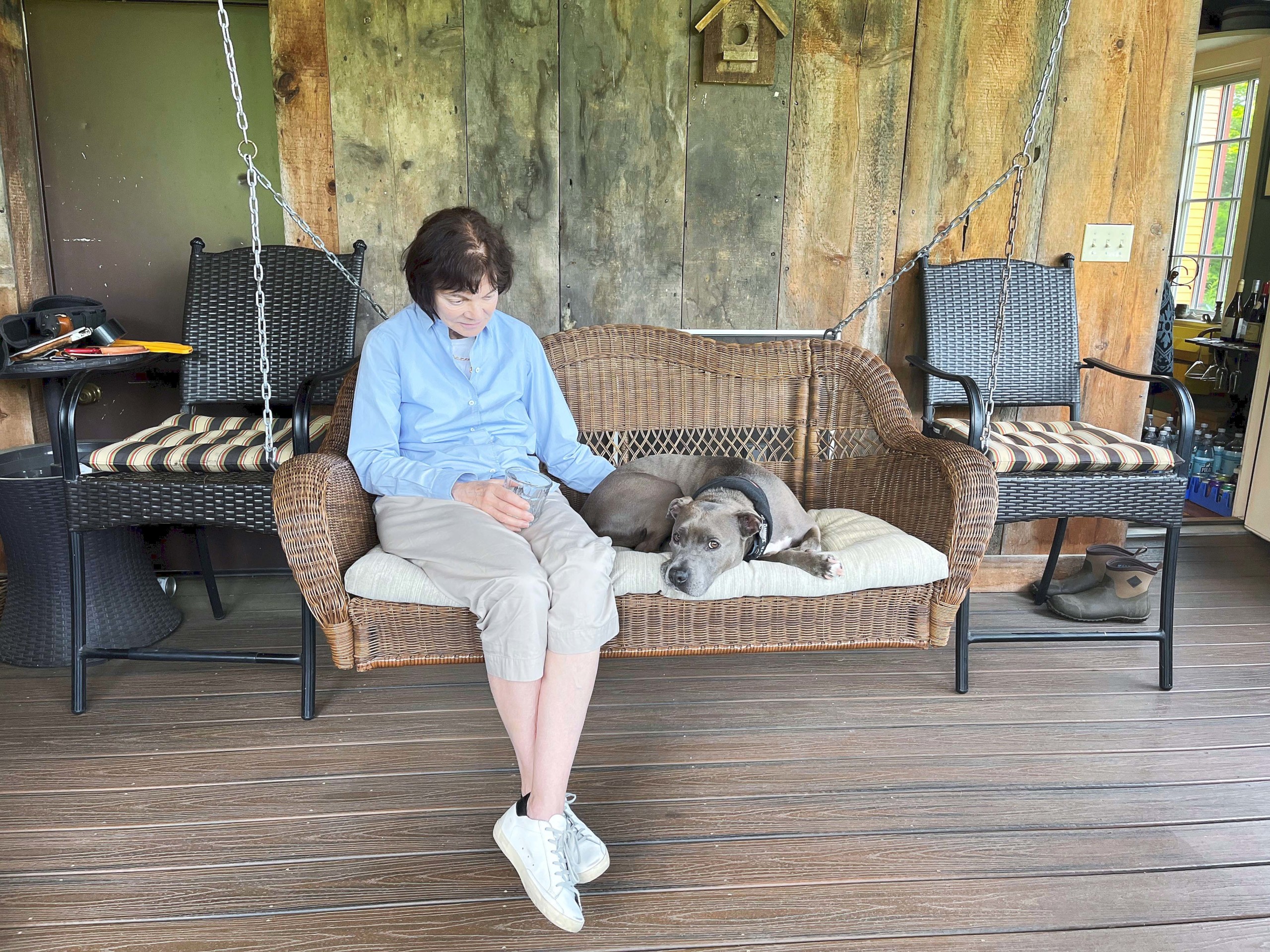
Betsy with Scarlet, 2024. Photo courtesy Ivy Pochoda.
Betsy Pochoda was an enigma, by her own design.
She could be intimidatingly intelligent and an incorrigible flirt. She could hold an intelligent conversation on virtually any topic — historical, contemporary, scientific — if only by knowing the appropriate questions to ask. Her knowledge was vast and her thirst for learning boundless. She could play the role of social elitist as well as the most passionate of egalitarians.
Our meeting at Peaceable Farm, when she took the editorial leadership at The Magazine ANTIQUES and visited with publisher Jennifer Norton, was a bit of a tango as we assessed one another. Her connection to New Hope, pre-dating my own by a decade when she was wed in the barn on Ney Alley adjacent to Ed’s current home, set a foundation stone for a relationship that grew steadily over our years of association with the magazine and continued following her departure from that illustrious publication. Whether it be meeting for dinner, a drink, the theater or visits to her magical home in Cobble Hill or mine in Bucks County, our time together was always to be anticipated and enjoyed to the fullest. There was always laughter, the first and essential ingredient of friendship, and a bearing of souls and dogs.
For all of us who knew Betsy Pochoda as a friend, there is a deep shared sense of loss. My chest will tighten as I hold back the tears each time I think of her, and I inevitably fail. I’d thought that if I were to ever get the book brewing in my head the past two decades to the page it would be Betsy I’d turn to for an honest review and possible editing — a frightening prospect as well as a generous kindness should she agree. But, that brilliant editor is gone. Her memory is not. She will live in the hearts of all who loved her and in the many pages she touched with a pen.
—Patrick “Pat” Bell, Olde Hope, New York City & New Hope, Penn.
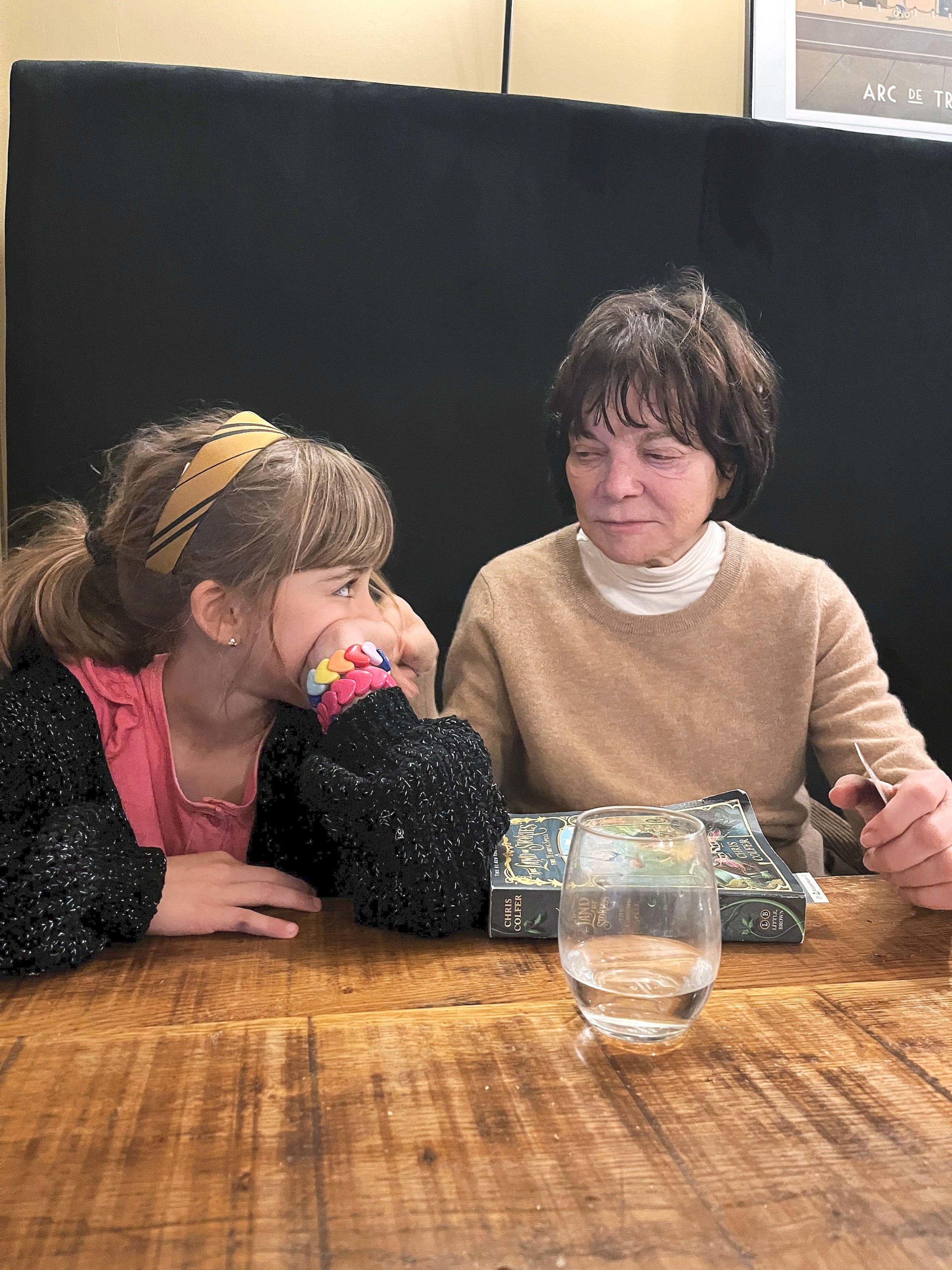
Betsy with her granddaughter, Loretta, in 2023. Photo courtesy Ivy Pochoda.
The Brooklyn Academy of Music. Packed house. Dr John’s “Right Place, Wrong Time.” Betsy jumped up on her chair, which immediately collapsed under her 98 pounds. Both of us howling with laughter. Betsy looked up, and, with a completely straight face, said, “I suppose we won’t be invited backstage.”
That sense of humor: quiet, razor sharp and, occasionally, a little evil.
When her pitbull Violet (whom I nicknamed “Violent”) cornered Betsy’s portly and extremely tipsy house guest on the stairs, rather than rescuing the terrified man, Betsy sat on the steps squealing with glee. A decade later, the incident evoked the same rollicking laughter.
Her interests were wide-ranging and comprehensive, her knowledge of baseball encyclopedic, her range of friends all-encompassing.
Betsy never talked about her accomplishments but her lengthy obituary in The New York Times attests to her stature (Seriously — how many people rate an obit in the Times?). Anyway, Betsy saved all her bragging for her brilliant daughter, Ivy. Bursting with pride, every new book of Ivy’s was circulated, along with the consistently enthusiastic reviews.
We decided a couple of years ago that we needed to live at least part-time in the city we both loved: New Orleans. So, we started looking for a small place we could share on alternate weeks. We found the perfect one the week before she got sick.
Dr John said New Orleans was “the city of spirits.” I hope Betsy is there now.
—Elle Shushan, Philadelphia
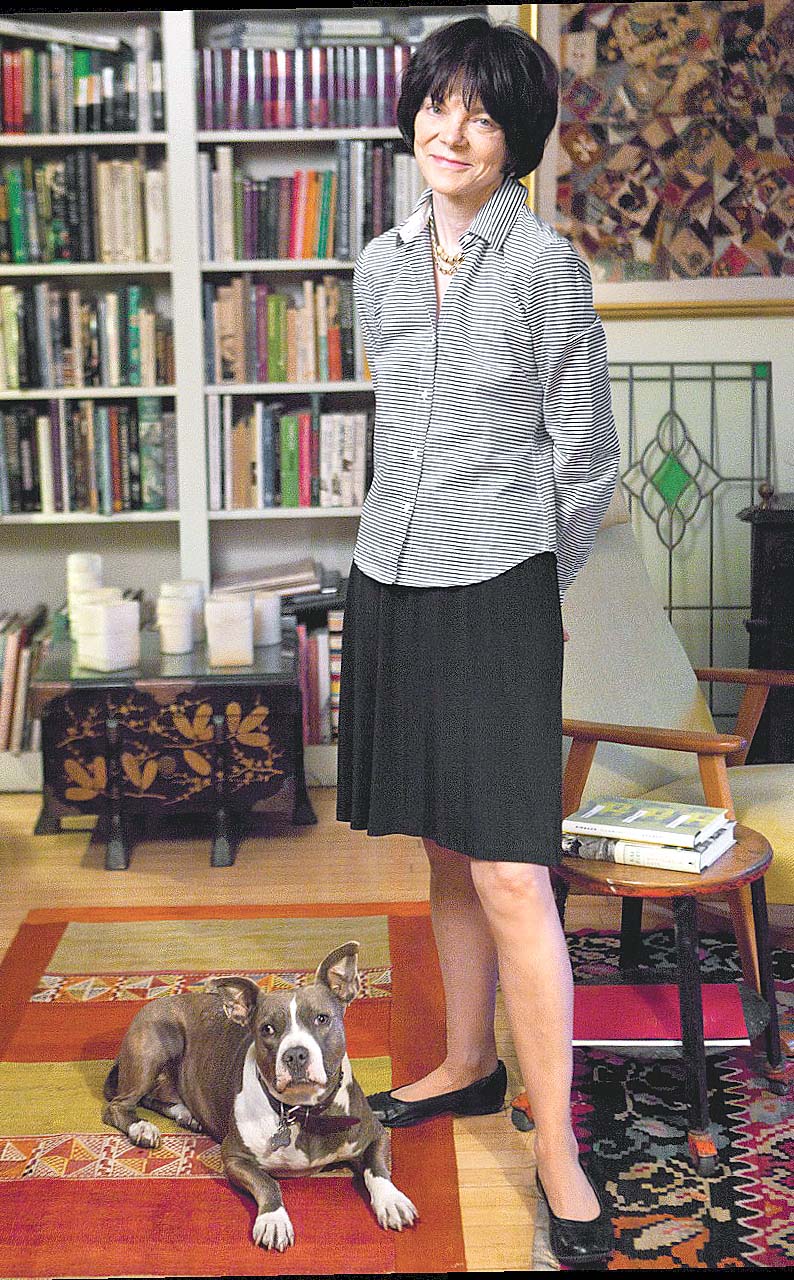
Photo courtesy The Magazine ANTIQUES.
I am surely not the first to describe Betsy as a force of nature. Anyone who came into her orbit felt it immediately. Her vision, intellect and sense of style went well beyond those of most people you’ll ever meet, certainly well beyond my own, attracting multitudes of admirers across an array of disciplines. She was a game-changer at ANTIQUES, bringing in those new voices, as well as a breadth of experience and knowledge, that opened windows onto ideas, aesthetics and material culture across time, from the magazine’s traditional roots into our own day. Indeed, among my many memories of her years at the mag, my favorites include our trips together to several museums — Peabody Essex, Shelburne and the Huntington — to explore their holdings through the eyes of contemporary artists and artisans. How she knew so many creative people amazed me, though it shouldn’t have, given how her insights and inquisitiveness inevitably drew them to her.
Most of all, I will treasure that we were more than colleagues, we were friends, spending time together outside of work. We laughed a lot, enjoyed meals cooked on her chef’s stove, took day trips, discussed politics and people, mostly our children (and then our grandchildren) and sometimes we just sat together and enjoyed the silence — Betsy could do that too.
—Eleanor Gustafson, consulting editor, The Magazine ANTIQUES

